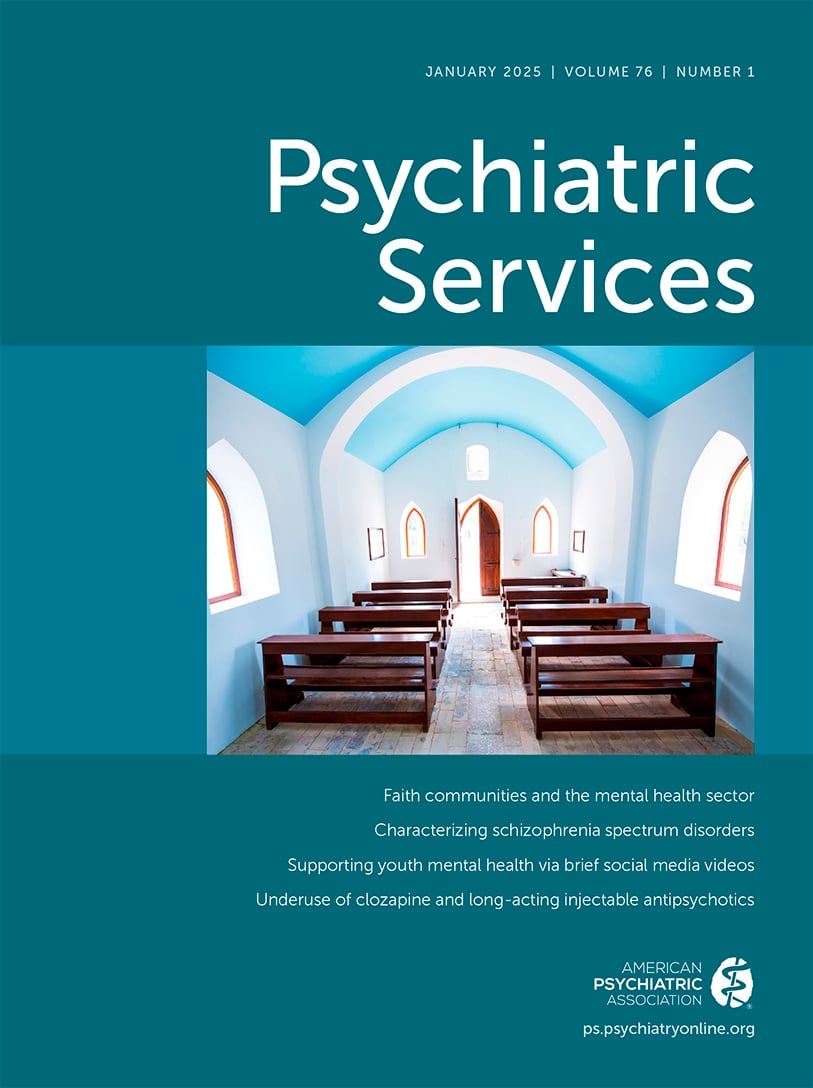Psychiatric Services
- Volume 48
- Number 4
- April 1997
Publication date: 01 April 1997
Pages485–490OBJECTIVE: To provide comprehensive information on expenditures for mental health and substance abuse services for a large number of people with severe mental illnesses, this study examined use of major types of clinical-medical mental health and ...
https://doi.org/10.1176/ps.48.4.485Publication date: 01 April 1997
Pages491–496OBJECTIVE: The study examined the impact of easy access to ambulatory services for patients with bipolar disorder in a clinic-based program at a Veterans Affairs medical center. Core program components included medication administration based on treatment ...
https://doi.org/10.1176/ps.48.4.491Publication date: 01 April 1997
Pages497–503OBJECTIVE: Three types of case management were compared to determine their relative effectiveness in helping people with severe mental illness who were homeless or at risk of homelessness. METHODS: Subjects recruited from a psychiatric emergency room and ...
https://doi.org/10.1176/ps.48.4.497Publication date: 01 April 1997
Pages504–509OBJECTIVE: This paper compares the prevalence of mental illnesses and alcohol and drug abuse and the residential histories of homeless individuals identified as having a mental illness and individuals who are not so identified. The cohort consisted of ...
https://doi.org/10.1176/ps.48.4.504Publication date: 01 April 1997
Pages510–513The role of the psychiatrist in board-and-care homes has been changing dramatically since a job description was published in 1989. The role has become more complex as a result of advances in psychopharmacology, the trend toward polypharmacy regimens, the ...
https://doi.org/10.1176/ps.48.4.510Publication date: 01 April 1997
Pages514–517OBJECTIVES: This paper describes current and potential roles of public health nurses in the care of adults with serious mental disabilities and explores incentives and barriers to the expansion of the role of public health nurses in this area. METHODS: ...
https://doi.org/10.1176/ps.48.4.514Influences on fit between psychiatric patients' psychosocial needs and their hospital discharge plan
Publication date: 01 April 1997
Pages518–523OBJECTIVE: The study examined factors that help determine a good or poor fit between the psychosocial support needs of hospitalized patients and the hospital's discharge plan. METHODS: The Mount Sinai Discharge Planning Inventory was completed weekly for ...
https://doi.org/10.1176/ps.48.4.518Publication date: 01 April 1997
Pages524–527As part of an evaluation of the Utah Prepaid Mental Health Plan, the Process of Care Review Form was developed to assess the quality of the process of psychiatric care provided by Utah's community mental health centers (CMHCs) to clients with ...
https://doi.org/10.1176/ps.48.4.524Publication date: 01 April 1997
Pages528–530Relationships among demographic characteristics, diagnostic groups, presenting problems, and service use were examined in two groups of mentally ill persons: a group of 60 formerly homeless persons who had been housed for at least 24 months and a group of ...
https://doi.org/10.1176/ps.48.4.528Publication date: 01 April 1997
Pages531–533In a pilot HIV prevention program for 35 adolescents in a psychiatric hospital, patients completed assessments of their HIV-related knowledge, attitudes, and behaviors before entering the program, at discharge, and three months after discharge. At ...
https://doi.org/10.1176/ps.48.4.531Publication date: 01 April 1997
Pages534–536The prevalence of sexual abuse and its association with specific axis I diagnoses among 38 women patients in a psychiatric outpatient clinic were examined. Sexual abuse history was recorded in a face-to-face interview, severity of the abuse was rated on a ...
https://doi.org/10.1176/ps.48.4.534Publication date: 01 April 1997
Pages536–538Twelve residents and 12 attending psychiatrists in the adult division of a university-based department of psychiatry responded to a 20-item questionnaire about medication backup, or the provision of psychotropic medications for a patient treated in ...
https://doi.org/10.1176/ps.48.4.536Publication date: 01 April 1997
Pages539–540Factors affecting the mental health care of ethnic minority groups in the United States deserve serious consideration. Hispanics, the second largest of these groups, face problems of access to care, high rates of substance abuse and HIV, and shortages of ...
https://doi.org/10.1176/ps.48.4.539Publication date: 01 April 1997
Pages541–542In the past decade, more than 800 United States hospitals closed their doors forever. Many were psychiatric hospitals. Mental health professionals should be especially aware of the pain that hospital closure may cause for patients, staff, families, and ...
https://doi.org/10.1176/ps.48.4.541Article
Article
Article
Past Issues
View Issues Archive
Vol. 76 | No. 1

Vol. 75 | No. 12

Vol. 75 | No. 11
